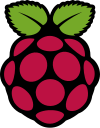
Back Raspberry Pi ALS Raspberry Pi AN راسبيري باي Arabic Raspberry Pi Azerbaijani Raspberry Pi Byelorussian Raspberry Pi Bulgarian রাস্পবেরি পাই Bengali/Bangla Raspberry Pi BS Raspberry Pi Catalan ڕازبێری پای CKB
 | |
 various Raspberry Pi computers | |
| Also known as | RPi, Raspi |
|---|---|
| Type | Single-board computer |
| Release date | 29 February 2012 |
| Operating system | Linux (incl Raspberry Pi OS) FreeBSD NetBSD OpenBSD Plan 9 RISC OS Windows 10 Windows 10 IoT Core[1] QNX and OS-less Embedded RTL's[clarification needed]. |
| Storage | MicroSDXC slot, USB mass storage device for booting[2] |
| Website | www |
Raspberry Pi (/paɪ/) is a series of small single-board computers (SBCs) developed in the United Kingdom by the Raspberry Pi Foundation in association with Broadcom. The Raspberry Pi project originally leaned toward the promotion of teaching basic computer science in schools.[3][4][5] The original model became more popular than anticipated,[6] selling outside its target market for diverse uses such as robotics, home and industrial automation, and by computer and electronic hobbyists, because of its low cost, modularity, open design, and its adoption of the HDMI and USB standards.
The Raspberry Pi became the best-selling British computer in 2015, when it surpassed the ZX Spectrum in unit sales.[7]
- ^ Upton, Liz (30 April 2015). "Windows 10 for IoT". Raspberry Pi Foundation.
- ^ "Pi Bootmodes". Only Supports Pi 2 v1.2 and up.
- ^ Cellan-Jones, Rory (5 May 2011). "A£15 computer to inspire young programmers". BBC News.
- ^ Price, Peter (3 June 2011). "Can a £15 computer solve the programming gap?". BBC Click. Retrieved 2 July 2011.
- ^ Bush, Steve (25 May 2011). "Dongle computer lets kids discover programming on a TV". Electronics Weekly. Retrieved 11 July 2011.
- ^ Cite error: The named reference
1000xwas invoked but never defined (see the help page). - ^ Cite error: The named reference
bestsellerwas invoked but never defined (see the help page).